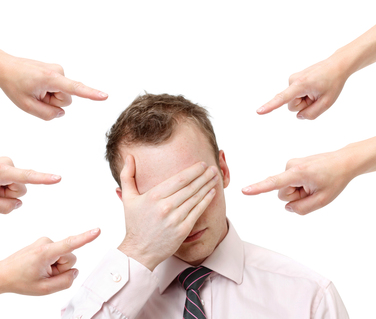Guilt plays major role in depression
By Liz Lockhart
Through research conducted by the University of Manchester it is possible to see that the brains of depressed people respond quite  differently to feelings of guilt. This difference exists even after the symptoms of depression have subsided. You can read more about depression here.
differently to feelings of guilt. This difference exists even after the symptoms of depression have subsided. You can read more about depression here.
The researchers from the University of Manchester discovered that by scanning the brains of people with a diagnosis of depression they could see that the regions of the brain associated with guilt were different compared to those who never suffer from depression. This same brain region is also responsible for the knowledge of socially acceptable behaviour.
This study is thought to provide the first evidence of brain mechanisms to support Freud’s observation that ‘exaggerated guilt and self-blame are key to understanding depression’.
Dr Roland Zahn, the lead researcher, said ‘Our research provides the first brain mechanism that could explain the classical observation by Freud that depression is distinguished from normal sadness by proneness to exaggerated feelings of guilt or self-blame. For the first time, we chart the regions of the brain that interact to link detailed knowledge about socially appropriate behaviour, the anterior temporal lobe, with feelings of guilt, the subgenual region of the brain, in people who are prone to depression.’
The researchers used fMRI (functional magnetic resonance imaging) to scan two groups of people. One group consisted of individuals who were in remission after suffering from major depression for more than year, the other group was comprised of people who had never suffered from depression.
The two groups were asked to imagine that they were behaving badly in ways such as being ‘stingy’ or ‘bossy’ towards their best friends. The participants in both groups then reported to the team of researchers how they felt about behaving like this.
Dr Zahn said ‘The scans revealed that the people with a history of depression did not ‘couple’ the brain regions associated with guilt and knowledge of appropriate behaviour together as strongly as the never depressed control group do. Interestingly, this ‘decoupling’ only occurs when people prone to depression feel guilty or blame themselves, but not when they feel angry or blame others.’
He added ‘This could reflect a lack of access to details about what exactly was inappropriate about their behaviour when feeling guilty, thereby extending guilt to things they are not responsible for and feeling guilty for everything.’
These findings are thought to be important as they demonstrate brain mechanisms underlying specific symptoms of depression. It is felt that this could explain why some people react to stress with depression rather than aggression.
The research team is now working on a further study to see if these results can be used to predict future depression risk after remission. They hope that, if successful, this could provide the first fMRI marker of such a risk.





